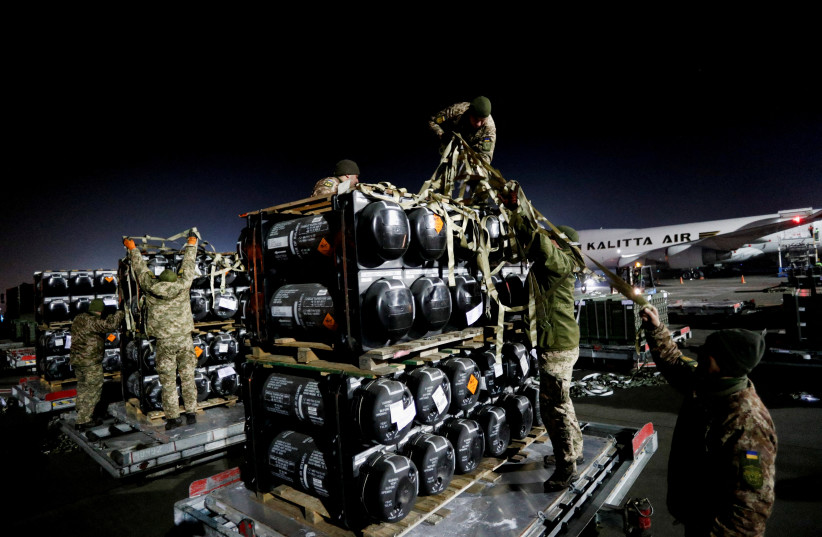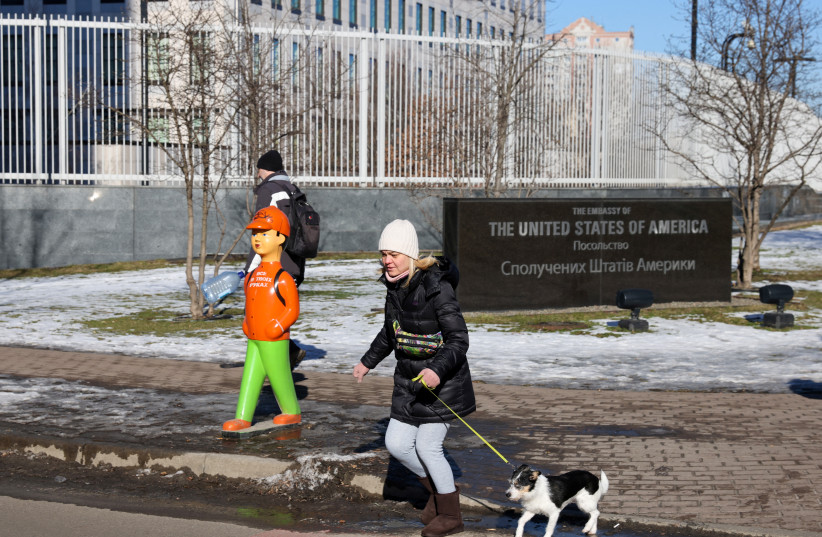The US, Canada and other countries have already moved their embassy operations to Lviv, in case of a Russian invasion.

Israel began preparations to move its embassy from Ukraine’s capital, Kyiv, to Lviv on Tuesday, even as Moscow said it would pull back some troops from the border.
Kyiv is in Ukraine’s East, close to the borders with Belarus and Russia, where Russia has amassed troops, while Lviv is in the West, near Poland.
A team from the Foreign Ministry visited Lviv on Tuesday to prepare for the possibility that it will need to move the embassy there.
The US, Canada and other countries have already moved their embassy operations to Lviv.

Meanwhile, additional staff arrived in Kyiv from Jerusalem to help the Israeli Embassy provide consular services to Israelis and Jews who wish to leave.
Foreign Minister Yair Lapid reiterated the government’s call for all Israelis to return to Israel as soon as possible.
“I call on Israelis who remain in Ukraine to leave,” he said. “The window of opportunity is on its way to closing.”
Lapid said he was proud of the Israeli diplomats in Ukraine.
“This is the spirit of the Foreign Ministry,” he said. “This is the Israeli spirit.”
Earlier this week, the Foreign Ministry issued a travel warning against visiting Ukraine and called on all Israelis to leave. It also evacuated diplomats’ relatives from the country.
However, “in a country with 10,000 to 15,000 Israelis and 150,000 to 200,000 Jews, you cannot remove the diplomats, because we’ll need them,” Lapid said earlier this week.
“We are proud that we are always there for Israelis in times of need,” he said. “It’s part of our mission.”
On Tuesday, Russia said some of its troops were returning to their bases after exercises near Ukraine, and it mocked Western warnings about a looming invasion. However, NATO said it had yet to see any evidence of a de-escalation that could avert a military conflict.
Russia did not say how many units were being withdrawn, or how far, after a buildup of some 130,000 Russian troops to the north, east and south of Ukraine that has triggered one of the worst crises in relations with the West since the Cold War.
The withdrawal of some Russian troops was a good sign, German Chancellor Olaf Scholz said Tuesday after meeting President Vladimir Putin in the Kremlin.
Others were more cautious. “The intelligence that we’re seeing today is still not encouraging,” British Prime Minister Boris Johnson said. Ukraine said the reported pullback needed to be seen to be believed.
“If we see a withdrawal, we will believe in a de-escalation,” Interfax Ukraine quoted Ukrainian Foreign Minister Dmytro Kuleba as saying.
NATO Secretary-General Jens Stoltenberg welcomed signals from Russia over the past two days that it might be looking for a diplomatic solution and urged Moscow to demonstrate its will to act.
“There are signs from Moscow that diplomacy should continue,” he told reporters. “This gives grounds for cautious optimism. But so far, we have not seen any sign of de-escalation on the ground from the Russian side.”
Russia often left military equipment behind after exercises, creating the potential for forces to regroup, Stoltenberg said.
At a joint news conference with Scholz, Putin referred only briefly to the troop movements and did not go into details.
Russia has always denied planning to invade Ukraine, saying it can exercise troops on its own territory as it sees fit. It has been pressing for a set of security guarantees from the West, including an assurance that Ukraine would never join NATO.
Putin told reporters Russia would not be satisfied with talk that the former Soviet republic was not ready to join any time soon and was demanding that the issue be resolved now.
“As for war in Europe… about whether we want it or not? Of course not,” he said. “That is why we put forward proposals for a negotiation process, the result of which should be an agreement on ensuring equal security for everyone, including our country.”
The diplomatic possibilities were far from exhausted, Scholz said.
“For us Germans, but also Europeans, sustainable security can only be reached… with Russia,” he said. “Therefore, it should be possible to find a solution. No matter how difficult and serious the situation seems to be, I refuse to say it is hopeless.”
In a separate development, Russia’s Duma, the lower house of parliament, voted to ask Putin to recognize two Russian-backed breakaway regions in Eastern Ukraine as independent.
Recognition of the self-declared Donetsk and Luhansk People’s Republics could kill off the Minsk peace process in Eastern Ukraine, where a conflict between government forces and Moscow-backed separatists has killed 15,000 people.
Asked about the move, Putin said the regions’ problems should be solved on the basis of the Minsk agreements, which were signed in 2014 and 2015 but have never been implemented. Scholz said all sides should stick to those accords.
Russia’s show of force near Ukraine’s borders has prompted months of frantic Western diplomacy and drawn threats of severe sanctions if it invades, culminating in a crescendo of US and British warnings in recent days that this could happen at any time.
“In terms of the timing of an attack, it could be imminent,” British Foreign Secretary Liz Truss said Tuesday. Russian troops could reach Ukraine’s capital Kyiv “very, very quickly,” she said.
France said it had yet to confirm the return of some troops to their bases, though this would be a positive sign.
Russian shares, government bonds and the ruble, which have been hit by fears of impending conflict, rose sharply. Ukrainian government bonds also rallied. Oil dropped more than 3% from a seven-year high reached on Monday.
The Kremlin sought to portray the moves as proof that Western talk of war had been both false and hysterical.
“February 15, 2022, will go down in history as the day Western war propaganda failed – humiliated and destroyed without a single shot fired,” Foreign Ministry spokeswoman Maria Zakharova said.
Russia’s Defense Ministry published footage showing tanks and other armored vehicles being loaded onto railway flatcars. But Western military analysts said they needed more information to judge the significance of the latest troop movements.
“One should maintain an air of cautious skepticism,” said Henry Boyd of the International Institute for Strategic Studies in London. “There have been past discrepancies between Russia’s official announcements and its actions on the ground.”
Konrad Muzyka, director of the Poland-based Rochan consultancy, told Reuters it would take several days to verify the latest moves via satellite imagery.
“It should also be noted that new trains with equipment from Central Russia keep on arriving near the border and that Russian forces continue to move towards staging areas,” he said. “The announcement stands in direct opposition to what Russia has been doing for the past few days.”
Commercial satellite images taken on Sunday and Monday showed a flurry of Russian military activity at several locations near Ukraine, including large deployments of troops and attack helicopters and warplanes moving to forward locations.
As reported by The Jerusalem Post
